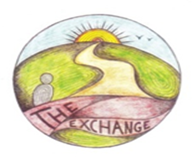It is important that we demonstrate some of the outcomes and wider impact of the recovery college model – including the significant financial ones we have found.
Service users, carers and staff told us that the impact was in 3 different places –for the individual, for the organisation and for the wider community.
So, along with general efficacy data, our evaluation framework measures individual impact through personal stories of change, organisational impact through the return on investment that the college generates for people who are also attending our secondary mental health services, and community impact through the co-creation of a social return on investment model.
To give a flavour of the enormous value that this model can bring, we would like to give the following headlines from The Exchange- our recovery college in Barnsley
- Courses are well attended by service users, the public and increasingly by our staff. In 2015/16 1111 people enrolled. All courses are co-produced by people with lived and professional experience and evaluate well.
- We are lucky that lots of people share their personal success, and here is a great example - ‘Before I came to the recovery college, I suffered with anxiety, panic attacks, depression, and agoraphobia. I couldn’t go out of my house; I was a prisoner in my own home. I hadn’t ever experienced this before; it was totally alien to me. I had lost all of my confidence. From being a very independent woman to not being able to do anything or go anywhere was devastating to me. I had to rely on family to support me and I had few reliable friends. Ever since coming to the Recovery College, I have had immense support from learners and staff, which has encouraged me to develop my confidence, self-esteem and knowledge. I have also established new friendships and even consider myself to have close friends! All courses have played a part in my recovery journey, since the very first course. I have never looked back. I am now a volunteer for at the College. My involvement and interest in the gym has lead me to recently complete a qualification in Gym Instructor training and I am hopeful that I will gain paid employment in this area. I now feel that I’m looking forwards with hope and positivity for my future.
- A financial return on investment analysis based on people who attend the college and also access CMHT support tells us that over a 3 month period there was a 25% reduction in CMHT contacts, and a 42% reduction in direct staff costs- a none cashable saving of £49 per person.
- In terms of Social Return on Investment (SROI), an actual social value map based on 58 learners tells us that for every £1 we invest in the recovery college, we generate £10.81 in social value. This is based on actual outcome data, direct staff costs and volunteers. Clearly a prospective social return based on enrolment figures would be far greater.
In summary- Recovery colleges deliver!
For more information please contact Jane Taylor (recovery college principal) [email protected] or Paula Rylatt (innovation development manager) [email protected] @rylatt_paula @allofusinmind

